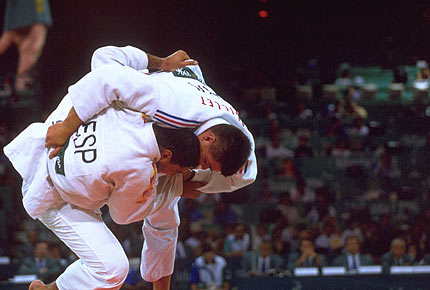
Atlanta, 20 July 1996, Games of the XXVI Olympiad. Judo heavyweight final bout: Ernesto PEREZ LOBO of Spain versus David DOUILLET of France. DOUILLET won the gold medal. Credit: Getty Images
Judo means "the gentle way" in Japanese. Of course, it is derived in part from jujitsu, the hand-to-hand combat technique of ancient samurai warriors, and everything is relative. While throwing opponents to the floor wins most matches, it is the only Olympic sport where submission holds allow choking an opponent or breaking an arm.
Developed by Dr Jigoro Kano in the 1880s, the sport broke into the Olympic Games in 1964 at Tokyo. The host country could add one sport, and Japan chose judo. Four weight classes were established, and Japanese entries promptly won three.
However, in the fourth, the open class, a 1.98-metre Dutchman named Anton Geesink defeated three-time Japanese national champion Kaminaga Akio before 15,000 people at Nippon Budokan Hall. And then he beat him again. It followed victories earlier in the year over other top Japanese opponents, deeply bruising the theory that a skilled judoka could defeat any opponent of any size.
(BOCOG)